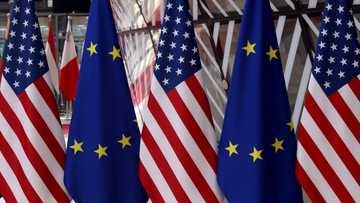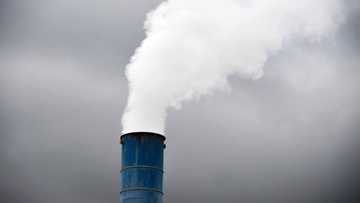“They'll Face Consequences”: Companies Helping Russia Evade Sanctions Will Be Blacklisted by US
- Russia is instructing its intelligence services to explore methods of circumventing sanctions and export controls
- In response to this development, the US strengthens sanctions: blocks property that is in the US and blacklists new companies
- Financial institutions that are involved in any activity that helps Moscow evade sanctions will lose access to the US financial system, among others
Legit.ng journalist Nurudeen Lawal has 8 years of experience covering Presidential Administrations
Shortly after Russia launched an unjustifiable and unprovoked attack on Ukraine in February 2022, the United States and its European allies imposed far-reaching sanctions against Moscow.
The sanctions which specifically target the political, military and indicted economic elite were imposed to weaken Russia’s ability to finance the war against Ukraine.

Source: Getty Images
Are these sanctions working?
Though there are a few contrary standpoints, the general belief is that the Western sanctions have been effective.
PAY ATTENTION: Сheck out news that is picked exactly for YOU ➡️ find the “Recommended for you” block on the home page and enjoy!
Josep Borrell, High Representative of the European Union for Foreign Affairs and Security Policy/Vice-President of the European Commission, said the sanctions are producing hard, tangible effects across Russia’s economy, despite the huge oil and gas revenues Russia used as a buffer in the first year of the invasion.
“Some people claim these sanctions have not worked. This is simply not true.
“Within a year, they have already limited Moscow’s options considerably causing financial strain, cutting the country from key markets and significantly degrading Russia’s industrial and technological capacity. To stop the war, we need to stay the course,” he said.
An investigative report by the Organized Crime and Corruption Reporting Project (OCCRP) gave credence to Borrell’s statement.
The report stated the sanctions have complicated Russia’s effort to secure foreign-made military technology.
“At the start of the invasion, its (Russia’s) forces used an estimated 80,000 shells per day, OCCRP quoted Alexander Kovalenko, a military analyst as saying.
“As the war has dragged on for longer than expected, those figures have declined to around 15,000 per day,” he said.
Russia moves to evade Western sanctions
Nevertheless, new developments have shown rising threats to degrade the effects of the sanctions.
Financial Times cited one senior US official as saying Russia is directing its intelligence services to find ways to evade sanctions and export controls.
It appears Moscow has now found allies in some purportedly neutral countries, financial companies and individuals that are reportedly helping it to evade some of the sanctions.
Sanctions that await indicted countries, companies individuals
To address the new developments, the US and its allies in Europe have introduced new sanctions and threatened to add more.
For instance, all property and interests in property belonging to sanctioned individuals and entities that are in the US or in possession or control of US persons have been blocked.
The US has also threatened to blacklist foreign financial institutions that support Russia’s military-industrial complex.
Legit.ng gathers that a new executive order signed by Joe Biden makes it clear to foreign financial institutions that they risk losing access to the US financial system if they get involved in any activity that helps Moscow evade sanctions.
Any indicted foreign bank will lose their US correspondent accounts, according to the new executive order.
No neutrality in war: List of countries helping Russia evade sanctions
“There cannot be neutrality between life and death,” Volodymyr Zelenskyy, president of Ukraine, once said in an interview while responding to questions on why African countries should back Kyiv against Moscow.
Almost two years after Russia invaded Ukraine, the truth in Zelenskyy’s statement became clearer: There cannot be any neutrality in a war, it’s either you support the aggressor or you side with the victim.
In March 2022 when 141 countries voted against Russia's invasion of Ukraine and five countries voted in support, 35 countries abstained, implying they took a neutral position.
However, recent developments have suggested that a number of these countries purportedly taking a neutral position are the ones helping Moscow evade sanctions.
Kazakhstan
Kazakhstan is one of the countries that claim to have officially taken a neutral stance on the war in Ukraine.
However, the Central Asian country appears to be fueling Moscow’s military power, according to the OCCRP report.
The report found out that Kazakhstan has significantly increased exports of cotton pulp, a key ingredient in gunpowder, to Russia since the 2022 invasion.
In 2022, the year of the invasion, Kazakhstan ramped up its shipments of cotton pulp and exported nearly 60 per cent more than the previous year to Russia, according to the United Nations Comtrade database.
Uzbekistan
The situation is similar in Uzbekistan, another Central Asian country. OCCRP reported that at least seven Uzbek companies sold a total of 4.8 million kilograms of cotton pulp to Russian import companies in the first nine months of 2023.
According to the investigative media platform, Russian importers buy the cotton pulp and supply it to military factories specialized in producing gunpowder and other propellants, thereby refuelling Moscow’s war in Kyiv.
South Africa
South Africa, another country claiming neutrality, was recently accused of supplying weapons and ammunition to Russia by U.S. Ambassador Reuben E. Brigety II.
Though President Cyril Ramaphosa said an independent inquiry found no evidence that South Africa supplied weapons to Russia, sources cited by Nations Media Group said there is a possibility that the country supplied some high-tech equipment that is “vital for supplying the beleaguered Russian war machine.”
China
According to the Atlantic Council, China, another country that abstained from the UN votes, has been helping Russia to mitigate the impact of the sanctions by providing Moscow with an alternative currency for transactions.
In early 2023 for instance, the Chinese yuan supplanted the dollar as Russia’s most traded currency.
Also, an unclassified US intelligence report cited by Reuters also indicates that China is helping Russia evade Western sanctions and likely providing Moscow with military and dual-use technology for use in Ukraine.
Analysts say the countries indicted for helping Russia may face sanctions.
The US, for instance, is not just one of South Africa’s largest trading partners, it has also helped the country with billions of dollars in aid and assistance programmes over the years.
There are fears that the US may withdraw its aid and break off the relationship with South Africa over its stance on Russia, thereby exposing the weakening Southern African economy to further risks.

Read also
"Top grades or get kicked out": UK reportedly set to deport Nigerian students, others over poor results
Meanwhile, some companies and individuals have also been fingered for helping Russia evade sanctions.
Some of them are located in the United Arab Emirates, Turkey, China, Hong Kong, Pakistan and even Russia.
Among others, these firms individuals help Russia facilitate and procure Chinese-manufactured weapons and technologies.
All these companies and individuals will be blacklisted and lose their properties in the US. They will also lose access to the US financial system, according to Biden’s newly signed executive order.
For instance, the Russian military plants receiving cotton pulp from Kazakhstan and Uzbekistan have been sanctioned by the US and Switzerland, according to OCCRP.
Russia bombs Ukraine’s grain stores: Why should Nigerians care
Meanwhile, Legit.ng previously reported that Russia recently launched airstrikes on Ukraine's grain storage facilities at Black Sea Port in Odesa, destroying tonnes of the country's grain.
Nigerian economists warned the attack could adversely affect the country's food security and destabilise its economy further.
Nigeria depends on other countries, including Ukraine, for the supply of grains, which includes wheat, to meet its market demand that local production has consistently failed to meet for decades.
PAY ATTENTION: Donate to Legit Charity on Patreon. Your support matters!
Source: Legit.ng









